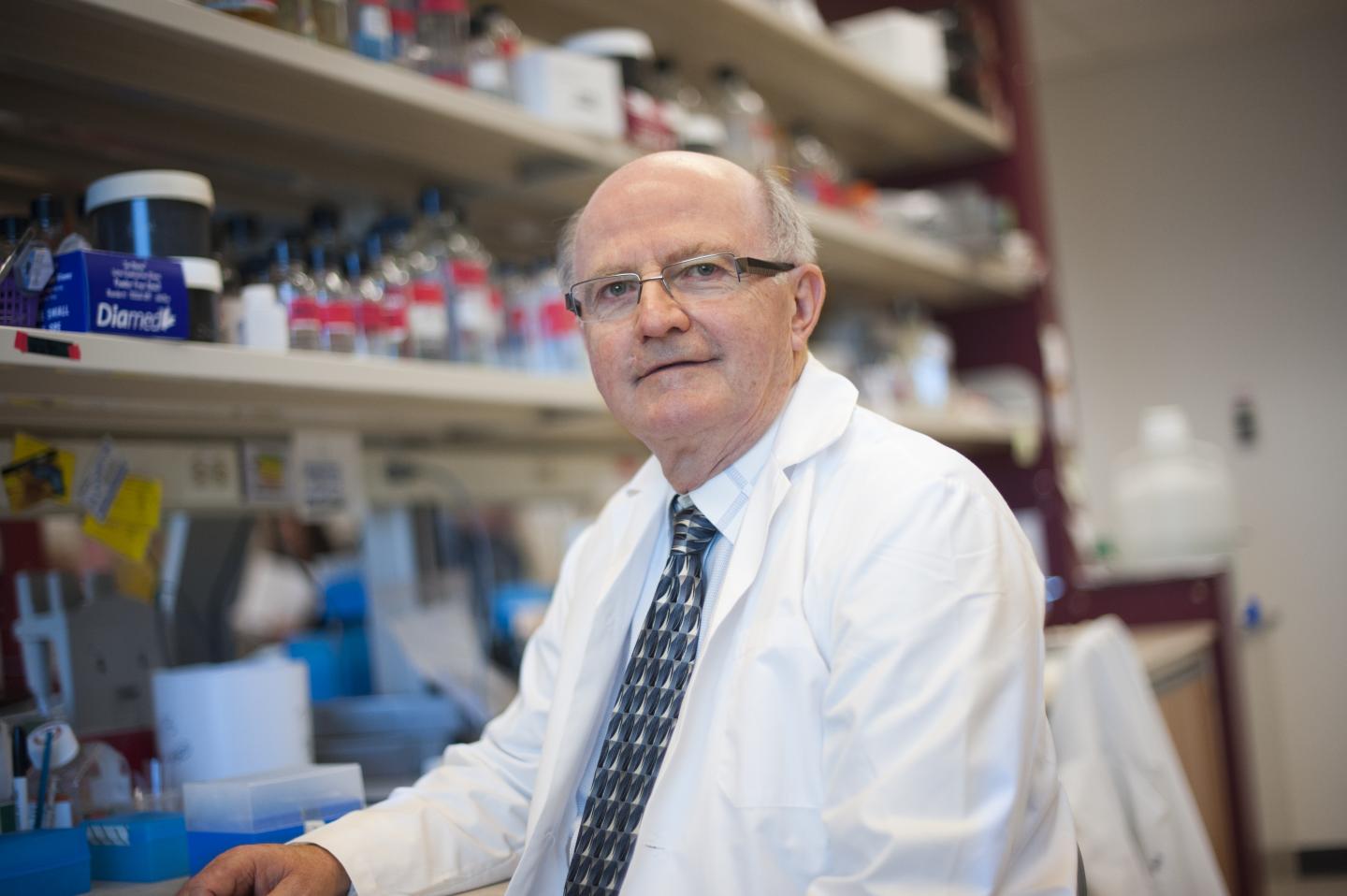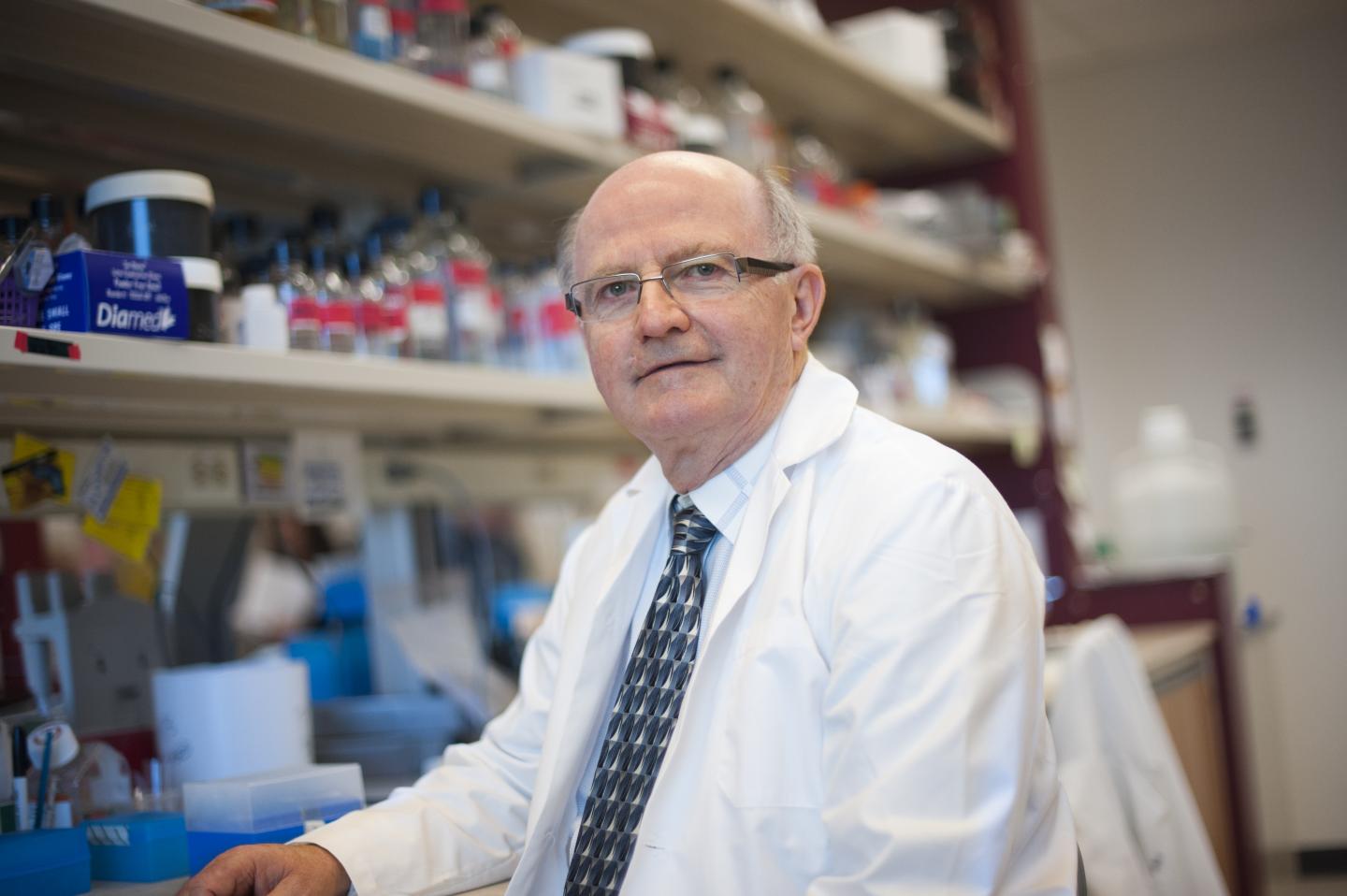
Credit: University of Alberta
Dr. Lorne Babiuk, a world-renowned virologist, highly acclaimed for his international leadership in vaccine development and research in veterinary infectious disease control, particularly zoonotic diseases, was presented with the 2016 World Agriculture Prize, which recognizes "exceptional and significant" lifetime achievements of a faculty member from a university working in the disciplines relating to the agricultural and life sciences.
The prize is bestowed by the Global Confederation of Higher Education Associations for Agriculture and Life Sciences (GCHERA) and was presented to Dr. Babiuk at a ceremony during the 5th Biennial Conference of the Regional Universities Forum for capacity Building in Agriculture in Cape Town, South Africa.
"Dr. Lorne Babiuk is a most deserving recipient," said John Kennelly, president of the GCHERA. Each year, it bestows this prestigious award, which is sponsored by the Education Development Foundation of Nanjing Agricultural University. "Dr. Babiuk has been responsible for major advances in our understanding of the biology of infectious diseases and the role of vaccines in their control, he has been a mentor and an inspiration to other scientists, and his vision and leadership resulted in the development of a world-class research and teaching facility at the University of Saskatchewan in Canada whose scientists continue to develop vaccines that make important contributions to animal health on a global basis."
Babiuk currently serves as the vice-president of research at the University of Alberta in Canada.
Babuik devoted his career to safeguarding the health of animals and people worldwide, primarily through the development of vaccines. He consistently fulfilled the promise he showed very early on in his career as a virologist when he worked on rotavirus, which causes animals to suffer acute diarrhoea. The issue was a major problem for the livestock industry, costing it approximately $300 million annually. Babiuk devised a new technique to grow the virus and then developed a vaccine to control the disease in calves.
It was the first of six vaccines Babiuk played a major role in developing over the years.
Like many other accomplished scientists around the world, Babiuk often questioned assumptions and always looked for different and better ways to find solutions to complex infectious disease issues. For example, in the early 80s, at a time when few people thought biotechnology would have any application in the animal health industry, he and his team of researchers developed the world's first genetically engineered vaccine for shipping fever, a disease that was causing the North American cattle industry $1 billion a year.
A few years later, Babiuk again broke scientific ground when he espoused that understanding the fundamentals of vaccine formulation and delivery rather than antigen production was the key to increasing the efficacy of vaccines. Since then, this theory has become accepted knowledge throughout the scientific community.
Whilst Babiuk is a most fruitful researcher, who has published more than 500 peer-reviewed papers and has more than 22,000 citations, he has always been committed to ensuring that his research results are exploited in practice and where appropriate commercially adopted.
That was evident while he helped build the Vaccine and Infectious Disease Organization (VIDO) at the University of Saskatchewan from 1975 onwards and led it from 1993 to 2007, building it into an international research powerhouse that, to date, has produced eight vaccines.
Babiuk's commitment to mentoring the next generation of researchers is equally impressive as he not only supervised more than 50 PhD students and more than 50 Post-doctoral fellows, he also created a unique-in-North America graduate program in vaccinology with ethical and social concerns arising from the production and use of vaccines in various populations.
BACKGROUND
The World Agriculture Prize
The Global Confederation of Higher Education Associations for Agricultural and Life Sciences (GCHERA), with Nanjing Agricultural University (NAU), established the GCHERA World Agricultural Prize in 2012 to recognise the contribution of a faculty staff member from an agricultural and life science university who has significantly contributed to the mission of the university through education, research and knowledge transfer for the benefit of society. This annual award is given for the fourth time in 2016. The Education Development Foundation of Nanjing Agricultural University generously sponsors this prize. The award of the prize to Dr. Lorne Babiuk is announced at Nanjing Agricultural University, PR China on the 20 September 2016 and the award will be made to Dr. Lorne Babiuk at a ceremony at the RUFORUM Biennial Conference on 18 October 2016 in Cape Town, South Africa
The Global Confederation of Higher Education Associations for Agricultural and Life Sciences (GCHERA)
The Global Confederation of Higher Education Associations for Agriculture and Life Sciences (GCHERA) was established in 1998 but in 2011 the governance structure was changed so that instead of individual university membership, its membership is now made up of 14 worldwide higher education associations who themselves represent individual universities in the agricultural and life sciences areas. For example, China is represented by the Education Professional Committee of the Chinese Association of Agricultural Sciences Societies, Europe is represented by the Association for European Life Science Universities, USA is represented by the Association of Public and Land Grant Universities and Canada is represented by the Association of Canadian Faculties of Agriculture and Veterinary Medicine.
The Mission of GCHERA is to encourage and support global co-operation among agricultural and life sciences higher education associations, and their member universities, so as to enhance innovation and leadership in education, research and outreach. GCHERA provides a forum for sharing of best practices as well as being a global voice on some of the most pressing challenges facing the world today. Agricultural and life science universities have a critical role to play in providing the human resources and the research and innovation needed to meet the challenge of feeding a rapidly growing world population whilst reducing the environmental footprint of our food and non food production systems.
See http://www.gchera.com for more details
###
Media Contact
Dr. Simon B. Heath
[email protected]
44-780-161-1525
@ualberta
http://www.ualberta.ca





